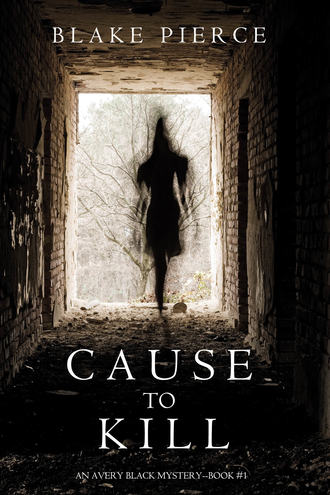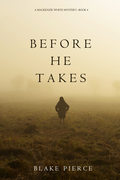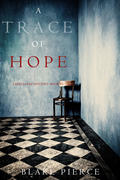
Блейк Пирс
Cause to Kill
CHAPTER TWENTY SIX
For a long time, Avery remained in the diner booth, alone. She ordered eggs and toast, a small salad, and a cup of coffee and just sat there, going over everything that had been said.
My daughter hates me, she realized.
More depressed than she’d been in years, she wanted to crawl in a hole and die. Instead, she paid the check and walked out.
Sunlight made her cringe.
Why can’t it be a rainy day? she wondered.
People on the street seemed to race by. Cars whizzed past her view. She stood alone among the activity like a spirit, not yet dead, not truly alive.
This is what the killer wants, she thought. He’s in your head. He’s laughing at you. Just like Howard. Just like Howard.
Avery went back to her car and drove.
Without any conscious thought to a destination, she found herself headed south – toward the prison. The bodies of all three girls kept flashing in her mind, and the killer and the car and the routes and some house, a house she imaged he might live in: small, hidden by trees with an unkempt lawn, because he had better things to do than mow a lawn. Her suspects were discarded, every one of them.
She needed a fresh start. A new perspective.
The prison parking lot was as she remembered. The walk inside was the same. Guards whispered behind her back and pointed. The woman behind the gates chided her for no appointment.
“He said he knew you’d back,” a guard laughed. “What are you, in love now? I guess I should believe everything I read in the papers.”
There was no real reason to go back. She didn’t actually believe he would help her, or could help her, not after the disastrous turn at Art for Life. He just liked to play games, she understood. But Avery was in the mood for games. She had nothing left to hide, nowhere else to go, and for some strange reason – at that moment in time – Howard Randall seemed like the only real friend she had in the world.
Howard sat in the basement meeting room as he had before, only this time, the smile was gone, he appeared concerned.
“You don’t look quite yourself today, Avery. Are you all right?”
Avery laughed.
If she had a cigarette, she might have taken it out and begun to smoke. She hadn’t smoked since she was a kid, but that’s how she felt: reckless, untouchable.
She took seat and placed her elbows on the table.
“Your last tip was bullshit,” she said. “An artist? Did you mean John Lang?”
“I don’t know who you’re talking about.”
“Bullshit!”
She aggressively smiled.
“You played me,” she said. “Nice move. Was that all so we could take a trip down memory lane and you could watch me break down in tears?”
“I take no comfort in your pain,” he said in earnest.
“Fuck you!” she yelled. “You’re playing games with me right now. You told me he was an artist. You practically handed him to me on a platter.”
“Your killer is an artist,” he said. “A true artist.”
“What’s that supposed to mean?”
“He takes great pride in his work. He’s no random killer. He’s no butcher. There is a purpose to his cause. These girls mean something to him. He knows them, personally, and in exchange for their lives he gives them immortality, in art.”
“How can you possibly know that?”
Howard leaned forward.
“You never asked me how I chose my victims,” he replied, “or why they were positioned in such ways.”
As Howard’s defense attorney, Avery had covered every possible avenue to get him acquitted. One of those avenues had involved understanding the killer’s mind and why he had committed such heinous acts, so that she could effectively distance Howard from the murders based on his own personal history.
“It was a statement on people that act dead in real life,” she said. “You picked your best students and charged them with some crime against humanity, and then you dismembered them and placed their parts on the ground to look like multiple people trying to escape from the underworld.”
“No,” Howard snapped.
He leaned back.
“What is life?” he urgently asked. “What does it mean? Why are we here?”
“How is that relevant to anything?”
“It’s everything!” he yelled and hammered the table.
A guard peeked through the viewing hole.
“Everything all right?”
“Yes, Thomas,” Howard said, “I’m just getting, excited.”
The guard left.
“Life is short,” Howard tried to explain, “and it’s cyclical. We live and we die again and again in a constant cycle within this atmosphere. How we live – in this life – affects all the other times we are reborn, the very energy of ourselves and our world. My victims were chosen because they had flaws, certain flaws that they would never have corrected in this life. That’s why I had to help them, so they could thrive in the next life.”
“Is that how you justify your actions?”
“This world is what we make of it, Avery. Anything we wish can be ours. My actions are based on my beliefs. How do you justify your actions?”
“I’m trying to make amends for my past, and I do it every day.”
He sighed and shook his head and appeared ready to blush, like a man that had finally, startlingly, found the woman of his dreams.
“You’re so special,” he gushed, “so very special. I knew it the moment I saw you. Tough and smart and funny and yet, flawed, broken by your past. I can help you fix that, Avery. Let me help you. There’s still time. Don’t you want to be happy, free?”
I want my daughter back, she thought.
“I want to find a killer,” she said aloud.
Howard eased forward, as sharp as a hawk.
“How did it feel when your father murdered your mother?”
Avery stiffened.
How does he know about that? she wondered. It was in all the papers, she told herself. It’s public record. Anyone can find that information.
“You want to dig up my past again?” she said, “Make me cry? Not today. I’m already at rock bottom. There’s nowhere else for me to go.”
“Perfect,” he said. “Now you can rise.”
The day of her mother’s death was clear in Avery’s mind.
It happened behind the house, after school. She came home and heard the shot. She was only ten at the time. One shot, silence, and then another. A run into the forest and she saw her father there, standing over her body, the shotgun in his hand. “Go get me a shovel,” he’d said.
“I felt nothing,” Avery admitted to Howard. “My mother was a drunk and never there for me. She made it clear I was a mistake. I felt nothing when she died.”
“What kind of mother are you?”
A crack. Avery felt a crack in the empty, desolate shell of her existence. And although she was empty and depleted, she began to realize she could still be hurt.
“I don’t want to talk about Rose.”
A deep frown furrowed Howard’s brows.
“I see,” he said. “I understand.”
He searched the ceiling, thought about something else, and turned back to her.
“Your killer knows these girls,” he said. “What do they all have in common?”
Avery shook her head.
“The third girl is a mystery for now,” she said. “The first two, both in college, both in sororities. One’s a senior, one’s a junior, so that’s no connection.”
“No,” he whispered.
“What?”
“No,” he said again. “You’re wrong.”
“About what?”
Disappointment sank his gaze.
“Have you ever heard the story about the boy and the butterfly?” he asked. “When a caterpillar transforms into a butterfly, the butterfly uses its body and wings to break free from the cocoon. It is a difficult, time-consuming task, but as the butterfly struggles and works, it gains muscle, and strength, and when it finally does breaks free, it is able to launch it into the sky and capture food with ease and survive. However, one day, a boy that kept caterpillars as pets saw one of his cocoons shake and move. He felt sorry for the budding creature and wanted to help it, so that it would not have to suffer so much. He asked his mother to cut a slight opening in the cocoon to aid in its escape. But that simple act, born of love and care, robbed the butterfly of its power, and when it finally emerged – all too soon – its body and limbs and wings were not yet strong enough to hunt or fly, and within days, it died.”
“What’s that supposed to mean?” Avery asked. “Am I the butterfly or the boy?”
Howard wouldn’t answer.
He simply lowered his head and remained silent, even when Avery continued to ask, and then shout, and then pound on the table for an answer.
CHAPTER TWENTY SEVEN
Agitated.
Avery was agitated by her meeting with Howard, angry and agitated.
What did he mean? she wondered. Everything I said was fact. Both in college. Both in sororities. One a senior. One a junior. What was wrong with that?
Arg! she mentally cried.
The streets were filled with people and cars. It was a Saturday, and she was officially off the case. Still, she didn’t just want to just kill time. She wanted to act. Start from scratch, she thought. The beginning.
Lederman Park was thriving with runners and dogs by the time she arrived. On the baseball diamond near the river was a softball game between men in blue and red.
Avery parked the car and walked to the bench where Cindy Jenkins had been found. The memory of the body was clear in her mind, the placement, the slight smile, and the look toward the cinema. He wanted to kill in threes, she thought. But that changed. Why did it change? Nothing about the three bodies had seemed very different. They were all handled with care, and except for the last body, they were all staring at threes – three women in love, three girls from WWII. What’s the connection? she wondered.
She sat down, not on the spot where Cindy had been placed, but on the opposite side of the bench, and searched her phone for any information about the number three: it was a magical number in most religions. It sounds like the word “alive” in Chinese. It was the first number that meant “all.” Noah had three sons. The trinity is three. Three. Three. Three.
Avery put down her phone.
You wanted to kill three, she thought. There was power in three. But then something changed. What changed? What made you want to kill more?
From her meeting with Howard, Avery was beginning to believe the killer had some kind of higher belief system, maybe of a religious god, maybe of his own type of god. A god that needed young girls. Why? Avery thought. Why do you need young girls?
Both in college. Both in sororities. One a senior. One a junior.
No, Howard had said.
She drove to Auburn Cemetery.
As she stood before the spot where Tabitha Mitchell had been placed and as she stared across the great cemetery, Avery felt like she was in some kind of surreal world that wasn’t completely her own. The drive to Lederman Park. The drive to the cemetery. They were calming, peaceful. He would have experienced the same thing. No fears. No worry that he would be caught. Just another beautiful day.
Stony Brook Children’s Playground in Belmont was a hotbed of activity. Avery was surprised that the crime scene had already been cleaned up. Children ranging in ages from babies to eight-year-olds could be seen everywhere. The older kids ran through the sprinklers and climbed up and down the wooden castle. Mothers cried out and chased their young. Kids cried from bumps on their heads. Some of the mothers and nannies glared at Avery, as if they knew her or they were trying to place her face.
She headed over to the castle entrance where the third girl had been placed.
A child peeked out from the opening.
“Hi,” he said and scrambled away.
Avery imagined the way the girl had looked, and then she turned to stare at the mural with countless children holding hands.
What’s the connection? she wondered.
Both in college. Both in sororities. One a senior. One a junior.
No.
She dialed a number.
The gruff voice of Talbot Diggins answered.
“What’s up, Black? Thought you were dead.”
“Why would I be dead?” she asked.
“Don’t you ever read the papers? East Coast is in a panic over this killer. Three girls in a week? You’re front page news again. Says you’re off the case. On official leave.”
“I’m not on official leave.”
Children could be heard around Talbot. They squealed. He said, “Hold on a sec,” and then his voice muffled and she heard, “Quiet, rascals. Can’t you see papa’s on the phone. Go bother your mother. Get out of here! Go I’ll be there in a second.”
‘Sorry,” Avery said, “I’m disturbing you.”
“Nah,” he came back, “just another Saturday in the park. What’s up, Black?”
“I called to find out about the third victim.”
“Yeah, I got a call from Lieutenant Connelly at your office. He said he’s heading up the investigation now. Wanted to know what we found. He sounds like a real dick. Ran her prints through the system and got a match. Was involved in some stupid college prank last year. Her name is Molly Green. Media hasn’t been informed yet, so keep this to yourself. She was a Brandeis senior. Finance major. Not a very good student. Not a sorority girl either, so no more ‘Sorority Killer.’”
“Did you talk to anyone at Brandeis?”
“Spoke to the dean. Again, very hush, hush for now. He doesn’t want anything revealed until he can make his own statement on Monday. He referred me to a guidance counselor named Jessica Givens. Apparently, Molly was having panic attacks about the job market.”
“Job market? Did the victim have a job?”
“Counselor didn’t say. But she did tell me that it all worked out in the end.”
“Can I have the number for that counselor?”
“Yeah,” he said. The phone moved away from his face as he searched for the number and yelled it out so that Avery could hear. “Got that?” Avery typed it into her phone and wrote down the name Jessica Givens. “I got it,” she said.
“You talk to her friends?” Avery asked.
“My team reached out to friends and family yesterday. Some are still on it today. She worked as a part-time nanny for a family near the school. Last time anyone saw her alive. Killer snatched her around the house on her way home Thursday night.”
“How do you know that?”
“My squad took some testimony from a young kid, fifteen years old, that lives across the street from the house where Molly worked. Kid said he couldn’t sleep. At about the time Molly got off from work, he saw a girl that matches her description exit the house and start talking to some guy near a blue minivan.”
Avery sucked in a breath.
“That’s what he drives,” she said, “a blue Chrysler minivan.”
“Yeah,” Talbot agreed, “that’s what your supervisor told me. Said they still had no leads on who owns that car, but they’re narrowing down the search. Kid said the perpetrator was wearing a hat and glasses. White guy, about five-six or five-five, lean but strong, between the ages of twenty-five and forty-five. That’s your guy, right?”
“That’s our guy.”
“Kid didn’t know what he was seeing. Says it looked like the girl passed out. The guy called for help and then put the girl in the car and drove away.”
“Did the kid call anyone?”
“No, he said it looked like the guy was taking care of her. Kid’s only fifteen.”
“Anything else?”
“That’s not enough?”
“Just trying to put all the pieces together.”
“You’re lucky I’m even talking to you, Black. Shit, that Connelly hates your ass.”
“Why are you helping me?”
“I guess I just have a thing for desperate, reckless white chicks that I read about in the papers,” he joked, and then his voice muffled again and he said, “Aw, come on, baby. I’m just playing. She’s a detective. No, I’m not interested in her. Hold on one sec.” Back in the phone he said, “All right, Black, I’ve got to go. Nice chat.”
The line went dead.
Brandeis, Avery thought. The third girl went to Brandeis University in Waltham – the furthest county west so far. The first victim went to Harvard, which is in Cambridge, right next to Boston. The second one went to MIT in Cambridge and was dropped off much further west at the cemetery in Watertown. Brandeis University is even further west, but the victim was taken east, into Belmont.
He lives in either Belmont or Watertown, she realized.
The logic seemed to make sense. He wouldn’t have wanted to travel further to find and place each girl he killed. Based on where he dropped off the bodies and took them, his travel time would have been shorter and shorter each time. Lederman is a long drive from out here in Belmont, she thought. All the way to Boston. Still, it was the first body and he wanted to make a statement —and create some distance from his home. Then he got bolder. The second body was further west, in Watertown. The third was even further, in Waltham. He can’t live in Waltham, she thought. Why would he want to drive all the way to Boston from there?
She called Finley.
Extremely loud and obnoxious heavy metal music could be heard in the background when Finley picked up.
“Yo, yo,” he cried.
“Finley, it’s Black.”
In nearly a whisper, she heard, “Oh shit,” and then the music went down and Finley was all business. “Look, Black,” he said, “I’m not supposed to talk to you about the case.”
“Are you still on car dealership duty?”
“Yeah?”
“The killer lives in either Belmont or Watertown. Narrow your search to those two counties and it will save a lot of time.”
“How do you know that?”
She hung up.
Accounting. Economics. Finance. All business majors.
Talbot said the third victim was stressed out about job interviews. Cindy had a job lined up at an accounting firm. What was the name? Devante, she remembered. Biggest firm in Boston. Did Molly have a job? Tabitha was a junior. Would she have a job?
She headed to her car.
On the way to Brandeis, she dialed Finley again.
“What the fuck!?” Finley snapped. “Leave me alone. It’s Saturday. This is the first time in two years I don’t have a shift on a Saturday or Sunday. Let me enjoy myself. Call Connelly. He’s on. Call Thompson. He’s on too.”
“Tabitha Mitchell,” she said, “did she have a job lined up somewhere?”
“A real job?”
“Yeah, a real job. Not a princess at Disneyland.”
“Why would she need a job? She was a junior, right?”
“I don’t know. That’s why I called you. Didn’t you talk to her family?”
“Yeah, the mother.”
“She never said anything about a job?”
“No.”
“Call her again. Find out if Tabitha had something lined up for the summer.”
“I’m off-duty.”
“You’re in the middle of a case!”
“I don’t have to fucking answer to you, Black!”
“There’s a killer on the loose!” Avery cried, “And he’s going to kill again. And I’m close, Finley, real close. I can feel it. Call the mom. Tabitha’s friends. Whoever you have to. I need an answer. Soon. Please. Call me when you know.”
“Fuck!” Finley screamed before she hung up.
CHAPTER TWENTY EIGHT
Avery took Route 20 all the way to Waltham County. The drive was slow.
Every few miles she had to stop at a light.
Jessica Givens never picked up her phone. After the fourth call, Avery realized it must be her work number. She left a message and called the operator.
“Hi there,” she said, “I need the number of a Jessica Givens in Waltham.”
“We have ten Givenses in Waltham,” the operator said. “Do you know where she lives?”
“No.”
An answering machine picked up at the dean’s office.
Avery drove on South Street directly into Brandeis. It took a while to figure out where to park.
Brandeis was one of the top-ranked financial institutes in the state. The central campus was a series of winding streets on a large hill that was incredibly difficult to navigate and walk. A number of antique-looking brick buildings dotted the property and were occasionally broken up by a stone castle, or a modern glass structure with eccentric architecture. After she parked, she walked up quiet paths and asked anyone she passed where to find the registrar. Eventually, she was directed to a small building that was almost completely empty. A single person worked a counter inside.
“We’re closed,” he said.
Avery flashed her badge.
“My name is Avery Black. I’m looking for Jessica Givens. I understand she’s a guidance counselor that works somewhere on campus.”
A very warm, friendly smile greeted her.
“Heyyyy,” he said. “You’re Avery Black. You hunt serial killers, right? Cool.”
“There’s nothing cool about a serial killer.”
“No, no,” he backtracked. “Of course not. I didn’t mean the serial killer. I meant you. You’ve been all over the news. I know who you are. They’re crucifying you in the papers.”
“I’m surprised you’re still talking to me.”
“Yeah,” he smiled, “you’re hot.”
The words seemed to have slipped out, and when he realized they’d been said aloud, he blanched and blushed and tried to backtrack.
“I’m sorry. That was totally unprofessional. I – ”
“It’s fine.” She flirted with her most winning smile. “Seriously.”
“Really?”
“Yeah.” She nodded and leaned in close. “Really. Can you help me?”
“Sure, sure. You’re lucky I’m still here. I was supposed to be off by now. Let’s see,” he thought and scanned his computer. “What do you need?”
“The cell phone number and home address of Jessica Givens.”
He peeked up over his screen. A lock of his wavy black hair covered one eye. He was young, probably in his early twenties.
“You know, I’m not supposed to give out personal information.”
Avery leaned closer.
“What’s your name?” she whispered.
“Buck.”
“Buck,” she said with her lips, and then she lowered her voice and looked both ways as if they were being secretly watched,
“I’m close to finding this killer, Buck. Jessica Givens has information that could help.”
Suddenly, he appeared worried.
“Did he attack someone here? I thought it was just Harvard and MIT.”
“Let’s just say no one is safe, Buck. Every college girl is a target. But Jessica Givens,” she stressed and pointed toward the door, “she knows something. Something important. A piece of information that could solve this whole case. I can’t trust anyone else. I’m on my own here. Can you help me? Just between us. No one else has to know.”
“Shit, ” he whispered. “Sure,” he said. “Sure, if it’s that important, all right,” he cheered, determined, and he gave her what she needed.
“Thank you,” she said. “I hope you realize that you could have just single-handedly helped me catch this killer.”
“Really?”
“Really,” she whispered in her best, seductive voice.
A finger went to her lips.
“Remember, our secret.”
“Definitely,” Buck said. “Just between us.”
Avery quietly backed away and slipped out the door. The second the sunlight hit her face, she dialed the number given.
“Hello?” someone answered.
“Is this Jessica Givens?”
“Yes. Who is this?”
“Hi, Jessica. My name is Avery Black. I’m one of the investigators on the Molly Green case. I understand you already spoke to Talbot Diggins?”
“How did you get this number?”
“Are you the counselor Detective Diggins spoke with about Molly Green?”
“Yes, I am. But this is a private line. I’m with family right now.”
“Molly Green is dead, Ms. Givens. We’re trying to track her killer. This will only take a second. You said the victim was stressed about her job interview process, is that right?”
“That’s right.”
“How was that problem resolved?”
“She received a job offer from an accounting firm about a month ago.”
Accounting firm, Avery thought.
Cindy Jenkins was hired by an accounting firm.
“Do you remember the name?”
“Of course,” Jessica said, “it’s one of the biggest firms in Boston. I was surprised she was hired. Her academic performance wasn’t like some of the other students who applied to the same company. It was Devante. Devante Accounting in Boston financial.”







